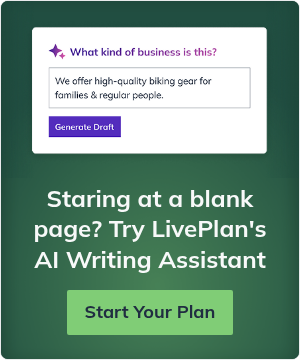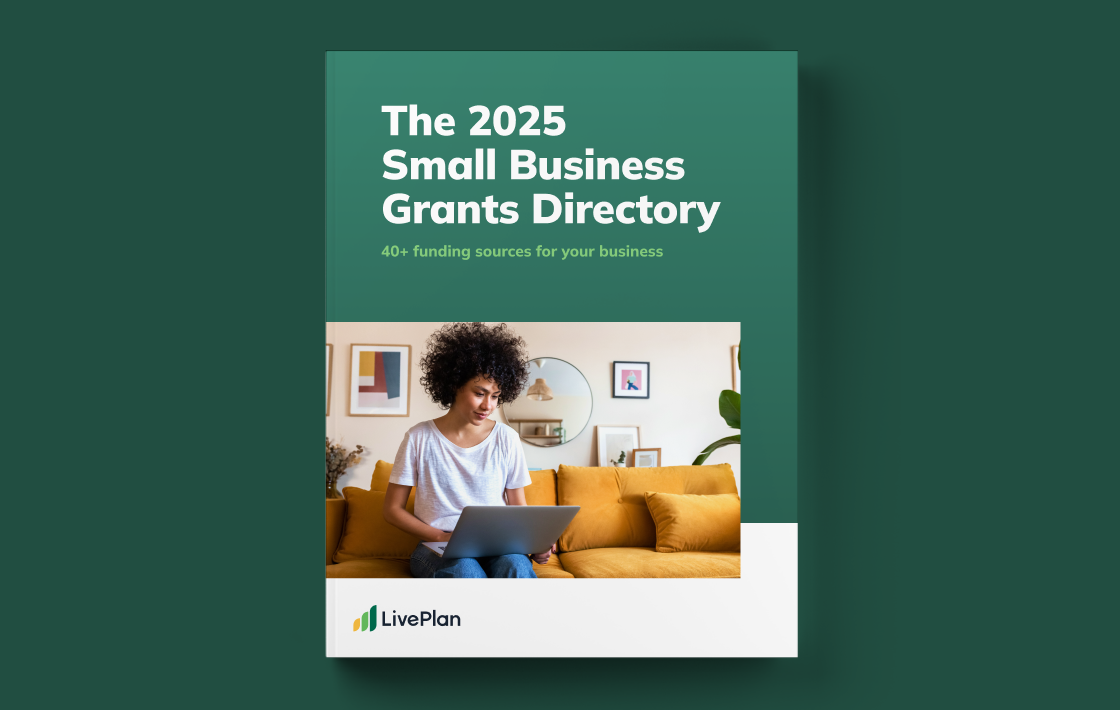LivePlan’s AI Experts

Jump to
It’s safe to say that 2023 has been the year of Artificial Intelligence.
The emergence of generative AI tools like ChatGPT has put powerful new tools into the hands of business owners. In growing numbers, businesses are using AI for:
Researching their market and competitors
Writing sales outreach emails
Creating blog posts
Setting up social media campaigns
Utilizing chatbots to answer common questions questions on their website
Drafting communication with staff and stakeholders
In fact, a recent Xero survey of over 3,000 small business owners around the world found that over half were either experimenting with AI or investing in AI tools. And despite concerns that the technology is advancing faster than it can be regulated, most respondents expected its impact on their business to grow in the coming years.
And yet, nearly 7 in 10 respondents said they see drawbacks to using generative AI in their business. Those include:
Inaccurate or biased content that could harm their reputation
Decreased efficiency due to time spent editing and revising AI content
Decreased employee morale driven by fear AI will replace their jobs
Turning to LivePlan for AI advice
As a leader in business planning insights and innovation, the LivePlan team has been closely following AI developments and their implications for entrepreneurs and small business owners.
We’ve recently added AI features to LivePlan that assist entrepreneurs with business plan writing, and suggest revenue streams for their financial forecast based on their business type. Adding AI features wasn’t a decision we made lightly; we know small business owners need to deeply understand all the pieces of their business plan. In fact, we’ve compiled the major pros and cons of using AI for business planning to help entrepreneurs understand the opportunities and potential pitfalls of this new technology.
Business and community leaders have turned to LivePlan recently for their AI insights as well. Over 1 million small business customers have used the app, and LivePlan keeps an open line of communication with them about their experiences and pain points.
Check out these excerpted questions from community members and responses from the LivePlan team at a pair of recent events – a Chamber of Commerce-sponsored business summit for young professionals, and a roundtable discussion hosted by an economic development organization.
LivePlan panelists:
Josh Cochrane, VP of Product
Josh Clark, Product Designer
Jedidiah Hurt, Director of Engineering
Peter Thorsson, Director of Business Development
Why has LivePlan invested so much time and effort to understand generative AI’s impact on business?
Josh Cochrane: First, it’s a transformative new technology that may have the potential to solve thorny problems for our customers. In our work, there’s sometimes a gap between the amount of help that our users want and how much we’re able to provide them. Historically, we can’t just, say, magically write business plan content for them. Except now with this technology there are new opportunities to help business owners. And those opportunities go much wider and deeper than just assistance with writing tasks. We’re really excited about the potential upside for our customers.
What role does LivePlan see AI models like ChatGPT playing in the planning process for small business owners?
Josh Clark: The thing that I love about AI, and how we’ve approached it with LivePlan is that we try to:
Reduce the skills gap
Use it to help people learn
Business planning requires a vast amount of skill that really excellent business owners or craftspeople may not have: Writing, financial forecasting, market research, copy editing.
We’ve attempted to try to fill the skill gap on some of those adjacent skills really important in business planning. By doing so, we can not only help them with a task that they haven’t mastered, but also train them to be more competent.
And that’s the important thing with AI. Research shows that AI can be used to help people go from non-mastery to intermediate-level mastery of a subject in half the time of regular training methods. So, by using AI we’re not only helping customers get the business plan written, but we’re helping them increase their own ability to think strategically about their business plan and its execution.
What challenges did the LivePlan team face when incorporating AI features into the app, and how will that work set LivePlan up for success?
Jedidiah Hurt: The challenges that the team faced were about setting up an entire end-to-end pipeline around building great products with these tools. The part that has taken the most time and effort is to really build an entire evaluation pipeline to standardize on, some rating or some evaluation data set that helps us understand if our customers are getting good responses or bad ones.
It’s something that we’re still working on. And we’re continuing to learn how to really make good use of that data. Maybe eventually we’ll get to the point of using that data to fine-tune a ChatGPT base model. I think that’s where we’re really getting into the trickier, more complex part of the process, really learning how to get a level of clarity and understanding of the user experience.
And it’s particularly challenging with LLMs (Large Language Models), because we never know exactly what answer they’re going to give. And so it’s part of what makes them really new and interesting and exciting, is that they’re kind of improvising in the moments. But it also creates a whole new host of challenges for creating predictable and consistently great user experiences.
What do you say to people who are skeptical about AI?
Peter Thorsson: People are arguing whether the hype is real for this whole thing. We can have that argument, but the fact that it’s happening in such a public sphere, and so many people are talking about it, means more people are feeling invested in new technology. We’re participating in a thing that’s changing the future of how we’re going to interact with software and hardware, so figuring out what your place in that is requires having some basic understanding of what we’re talking about with AI.”
What kinds of questions do you get from audience members struggling to know where to start with AI in their business?
Jedidiah Hurt: One specific question I’ve gotten is if there are any official training materials or courses, or something standardized that will really help people understand what these AI tools are and how to use them.
And I really encourage people to just get in and tinker and experiment with it. You need to build more of a direct intuition of how to really use these things. That would always go deeper and be more valuable than going and finding somebody else’s distilled experience of how to use it.
Think about tools like ChatGPT as a modern technological literacy tool, on a level with being able to use a smartphone or do a Google search or use the internet. AI will really become a standardized capability, and anybody who has the ability to use it well will have a lot of advantages.
How does LivePlan’s AI pivot reflect its mission of streamlining and improving business planning processes?
Josh Cochrane: Mostly that we literally practice what we preach. We’re trying to help people succeed in business — not just to get them to try our product or create a business plan, but to successfully accomplish their goals.
We are regularly, really constantly, thinking about how best to do that, how to use our resources and time and ingenuity to increase our own customers’ chances of success. If an amazing new technology shows up on a given day, there’s a chance we may rethink our current priorities and pivot to take advantage of it as soon as the day after.
That feels pretty good. And we’re continuing that regular review as we go. Our generative AI features have been popular and well received by our customer base. Our customers still have other needs too that are not so addressable with AI, and we’re prioritizing those opportunities as well, as warranted, not just limiting our focus to the ones that match nicely with the new technology.
Why do LivePlan team members take time to share their knowledge and experiences?
Peter Thorrson: It definitely stems from the company’s mission to support small businesses, and that includes non-profits. We even have a non-profit program where employees get a certain number of hours when they can volunteer paid time for local non-profits.
These panels and roundtables kind of dovetail into that. The amount of pressure we feel from the fast development of AI, we assume matches the sorts of feelings and experiences being felt by our local businesses. Because we’re so in touch with it, and so in tune with the day-to-day developments and what it means to respond to it, it’s how we got to the philosophy of adapting and adopting the technology, rather than fighting it or turning a blind eye to it.
All that means is that I think we’re in a pretty good position to just sort of tell our story for these people, and give it a bit of a learning experience vibe, but also a collaborative vibe.









